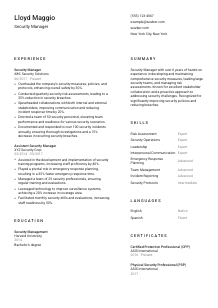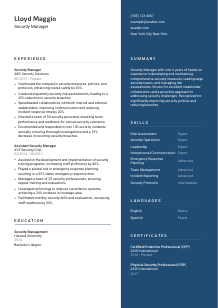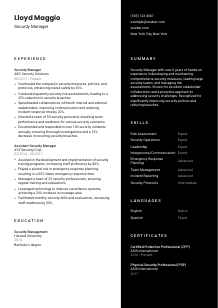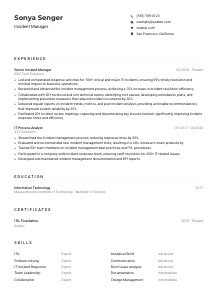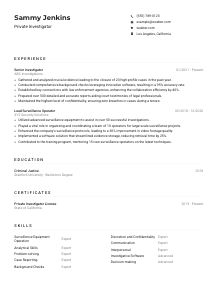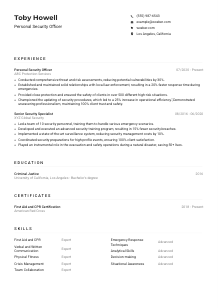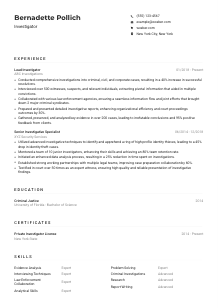Security Manager Resume Example
Shielding assets, but your resume seems exposed? Delve into this Security Manager resume example, fortified with Wozber free resume builder. Grasp how to detail your security strategies to meet job requirements, guarding your career trajectory as vigilantly as the premises you oversee!
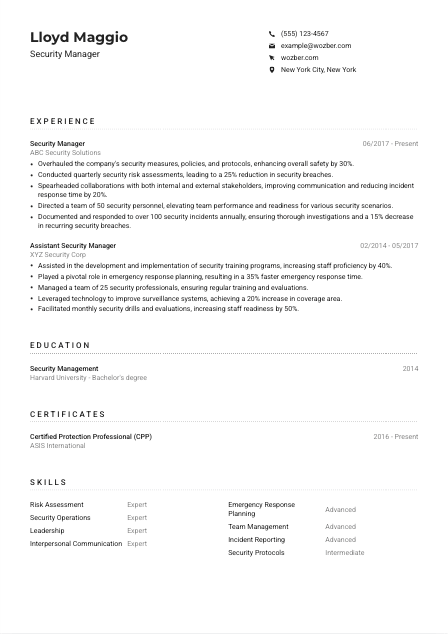
How to write a Security Manager resume?
Welcome, aspiring Security Manager! The quest to land your dream job is akin to overseeing a meticulous security operation. Here, your resume is your tactical plan, designed to breach the defenses of hiring managers and secure your position within the company. With the aid of Wozber's free resume builder, including its ATS-friendly resume template and ATS resume scanner, we'll embark on a mission to customize your resume, ensuring it's not only a reflection of your qualifications but a beacon of your unique capabilities.
Ready to strategize? Let's pave the path to your success!
Personal Details
Think of the Personal Details section as the first layer of security—your introduction. Let's engineer this section to create an immediate connection, with precision and in alignment with the Security Manager role.
1. Brand Yourself Right
Your name is your personal brand. Present it boldly at the top of your resume. Use a clear, prominent font to not just attract attention, but also to establish a professional aesthetic. Remember, in the world of security management, presentation counts!
2. Match the Job Title
Directly below your name, echo the job title you're applying for - "Security Manager". This is your first step in ATS optimization, as it aligns your resume with the requirements of both the ATS and the role, signaling you're tailor-made for the position.
3. Essential Contact Information
Ensure your phone number and a professional email address (think firstname.lastname@email.com) are listed clearly. Your contact information is the access key for potential employers to reach out, so verify its accuracy thrice over.
4. Location Matters
"Must be located in New York City, New York." When the job demands a specific location, indicate yours matches to preempt any doubts. This detail aligns your application with geographical prerequisites right off the bat.
5. Opt for Professional Links
If you have a professional LinkedIn profile or a personal website that showcases your achievements and portfolio in security management, include it. These links provide deeper insight into your professional history and potential.
Takeaway
Perfectly crafting your Personal Details is like establishing the first line of defense. It's about making sure you're perceived as the professional, prepared, and place-appropriate candidate right from the start. With precision and alignment, you're setting yourself up for a strong first impression.





Experience
Your experience in the field is your main arsenal. Let's align your career history with the Security Manager position, detailing your strategic operations and tactical executions that underline your expertise in security management.
- Overhauled the company's security measures, policies, and protocols, enhancing overall safety by 30%.
- Conducted quarterly security risk assessments, leading to a 25% reduction in security breaches.
- Spearheaded collaborations with both internal and external stakeholders, improving communication and reducing incident response time by 20%.
- Directed a team of 50 security personnel, elevating team performance and readiness for various security scenarios.
- Documented and responded to over 100 security incidents annually, ensuring thorough investigations and a 15% decrease in recurring security breaches.
- Assisted in the development and implementation of security training programs, increasing staff proficiency by 40%.
- Played a pivotal role in emergency response planning, resulting in a 35% faster emergency response time.
- Managed a team of 25 security professionals, ensuring regular training and evaluations.
- Leveraged technology to improve surveillance systems, achieving a 20% increase in coverage area.
- Facilitated monthly security drills and evaluations, increasing staff readiness by 50%.
1. Dissect the Job Requirements
Extract each requirement from the job posting and consider how your past roles fill these needs. For instance, if the job emphasizes "risk assessment, emergency response planning, and security operations", prepare to highlight your direct experience in these areas.
2. Structure for Impact
Organize your experience in reverse-chronological order. For each position held, start with your job title, the company's name, and your tenure there. This standard structure is not just reader-friendly but also ATS-compliant.
3. Detail Your Missions
For every role, zero in on achievements and responsibilities that reflect on the job's demands. Use action verbs like 'Overhauled', 'Conducted', and 'Spearheaded' to paint a vivid picture of your proactive approach and leadership in the field.
4. Numbers Tell the Story
Quantify your achievements wherever possible. Did you increase safety by 30% or reduce incident response time by 20%? Metrics provide concrete evidence of your impact, making your resume more compelling to hiring managers.
5. Relevance is Key
Every bullet point under your experience should relate directly to the Security Manager role you're seeking. Tailor your accomplishments to reflect the skills and responsibilities listed in the job description, ensuring a clear line between what you've done and what you'll be expected to do.
Takeaway
The Experience section is where you demonstrate you're not just capable but exemplary for the role. It's about painting a picture of a proactive, resourceful leader ready to take charge. Tailor your professional narrative to resonate with the demands of the position and watch your resume command attention.
Education
While the foundation of a successful Security Manager lies in their experience, your educational background is pivotal in establishing your competency and understanding of the field. Let's sculpt your Education section to reinforce your qualifications.
1. Highlight Your Credentials
"Bachelor's degree in Security Management, Criminal Justice, or related field." Directly align your highest relevant degree with the job's educational requirement. This not only checks a vital box but also validates your theoretical expertise.
2. The Blueprint of Education
Maintain clarity and brevity. Start with your degree title, followed by your field of study, then the university's name, and finally, your graduation date. This structured approach makes it easy for scanners—both human and digital—to verify your credentials.
3. Direct Degree Alignment
When your degree perfectly matches the job specification, make it known. If you hold a "Bachelor's degree in Security Management," as in our example, place this information prominently. It directly ties your academic background to the role's requirements.
4. Pertinent Coursera and Seminars
In cases where your degree is complemented by specialized courses, seminars, or certifications relevant to the security industry, list these too. They can highlight ongoing professional development and a deeper dive into specific areas relevant to a Security Manager.
5. Additional Accolades
Any scholastic achievements or affiliations—such as honors, relevant project work, or memberships in security-related organizations—can further underscore your commitment to the field. However, gauge their relevance based on your career stage and the job's level.
Takeaway
Your educational background is the scaffold on which your career is built. Ensuring it aligns closely with the job requirements signals to potential employers that you have not only the practical but also the theoretical grounding to excel in the role. Consider this section as further evidence of your suitability and commitment.
Certificates
In the realm of security management, certifications are badges of honor, indicative of your dedication to professional development. Let's ensure your resume reflects this commitment, spotlighting the certifications that matter most.
1. Identify Crucial Certifications
The job description pinpoints "Certified Protection Professional (CPP) or Physical Security Professional (PSP)" as preferred. If these are in your arsenal, they should be prominently listed. This shows your alignment with industry standards and the employer's preferences.
2. Select with Strategy
Include certifications that resonate most with the job at hand. This isn't the place for an exhaustive list of every course completed but rather a meticulously chosen showcase of your most relevant and recent achievements in the field.
3. Dates Matter
For each certification, include the issuance and, if applicable, expiration dates. This not only demonstrates your currency in the field but also aids in ATS optimization, by aligning with specific date-related search criteria.
4. Stay Ahead of the Curve
The security landscape is ever-evolving, and so should your expertise. Keep your certifications up-to-date and, where possible, continuously seek out new learning opportunities. This portrays you as a proactive security professional always striving for excellence.
Takeaway
Your certifications are more than just titles; they are proof of your ongoing commitment to excellence in security management. Carefully choosing which to showcase indicates not just your qualifications but your alignment with the specific needs and desires of potential employers.
Skills
The skills section functions as a quick-reference arsenal of your capabilities. For a Security Manager, this means balancing technical know-how with leadership and strategic foresight. Let's optimize this section so it's honed, targeted, and impossible to overlook.
1. Extract Required Skills
Comb through the job description to locate both stated and implied skills. For instance, "strong leadership and interpersonal skills" directly implies the need for team management and effective communication abilities.
2. Prioritize and List
Focus on listing skills that match those requested in the job posting. If "Risk Assessment" and "Security Operations" are mentioned as essential, these should headline your skills section, backed by your proficiency level to solidify your expertise.
3. Structure for Clarity
Maintain a clear and organized list, trimming any skills that don't directly apply to the position. This not only keeps your resume neat but ensures potential employers can easily match your capabilities with their needs.
Takeaway
Your skills section distills your professional essence, showcasing at a glance your fit for the Security Manager role. It's an opportunity to make it abundantly clear that your competency portfolio is in perfect alignment with the job requirements. Choose wisely and display proudly.
Languages
In a city as diverse as New York, the ability to communicate across cultures can be a significant asset, especially in security management where clarity and command are paramount. Let's strategically position your language skills as part of your professional toolkit.
1. Job Language Requirements
Given the explicit need for "the ability to communicate effectively in English," your proficiency in English should be prominently displayed. This assures potential employers of your capability to meet this basic but crucial requirement.
2. Showcase Additional Languages
After listing English, include any additional languages you're proficient in. For a Security Manager in New York City, being multilingual can be a distinct advantage in managing diverse teams and engaging with a multicultural clientele.
3. Honesty with Proficiency Levels
Clearly delineate your language proficiency levels. Whether you're "Fluent" in Spanish or have "Basic" proficiency in another language, an honest depiction helps set realistic expectations and showcases your awareness of your own capabilities.
4. The Global Edge
For roles involving coordination with international teams or stakeholders, being multilingual can offer a competitive edge. Even if not specified in the job description, your language skills can signify your capability to operate on a global stage.
5. Languages as a Security Tool
In critical situations, being able to communicate in another language can be the key to de-escalating potential threats. View your linguistic skills as another tool in your security management toolkit—one that adds depth and versatility to your portfolio.
Takeaway
Your proficiency in languages is not just about communication; it's about connecting, managing, and leading more effectively in a diverse environment. As a Security Manager, your ability to navigate linguistic barriers can add a layer of strength to your role, making you a versatile and inclusive leader.
Summary
Your resume's summary is akin to a security briefing: concise, impactful, and directed. It sets the tone for the rest of the document, highlighting your career trajectory and key achievements. Let's carve out a summary that showcases you as the formidable Security Manager you are.
1. Capture the Essence
Begin by absorbing the essence of the job description; let this inform your summary. Highlight your years of experience, key areas of expertise, and any notable accomplishments that align with the Security Manager role.
2. Solid Introduction
Introduce yourself as a proactive, results-driven Security Manager. Mention your history of developing and maintaining security measures and leading diverse teams. This sets a foundation that you're not just experienced but also leadership material.
3. Highlight Key Achievements
Pick a few significant achievements from your career that directly relate to the requirements of the position, such as risk reduction percentages or successful team leadership projects. This strategy demonstrates not only capability but also proven impact.
4. Keep It Sharp
Your summary should be a tightly honed signal flare, not a sprawling narrative. Aim for three to five lines that encapsulate your qualifications, achievements, and the unique value you bring as a security professional.
Takeaway
Think of your summary as the opening gambit in the strategic game of securing your next role. It's your chance to make a compelling case for why you're the ideal candidate, inviting hiring managers to dive deeper into the tactical details of your resume. Craft it with care.
Launching Your Security Manager Journey
Bravo on completing this comprehensive guide! With these strategies, you're well-equipped to construct a Security Manager resume that not only meets but exceeds job specifications. Armed with Wozber's free resume builder, including ATS-friendly resume formats and the ATS resume scanner, you have everything needed to craft a document that stands tall amidst the competitive landscape.
Your resume is more than a record; it's a reflection of your dedication and prowess in the field of security management. Go forth, take charge, and embark on your journey to success!

- Bachelor's degree in Security Management, Criminal Justice, or related field.
- Minimum of 5 years of experience in security management or related roles.
- Possession of relevant certifications such as Certified Protection Professional (CPP) or Physical Security Professional (PSP) is preferred.
- Demonstrated ability in risk assessment, emergency response planning, and security operations.
- Strong leadership and interpersonal skills with the ability to manage diverse teams.
- The ability to communicate effectively in English is a key skill.
- Must be located in New York City, New York.
- Oversee the implementation and maintenance of security measures, policies, and protocols.
- Conduct regular security risk assessments and recommend appropriate mitigation measures.
- Coordinate with internal and external stakeholders on security-related matters.
- Lead and train security teams ensuring readiness for various security scenarios.
- Monitor and report on security incidents, ensuring thorough investigations and follow-ups.





